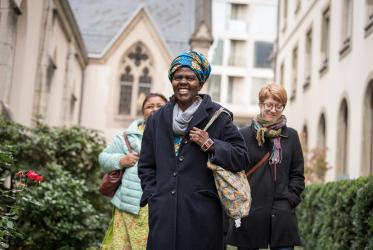Meeting with representatives of the Estonian Council of Churches
Address by Rev. Dr Samuel Kobia, WCC general secretary
Tallinn, Estonia
1 June 2007
Dear sisters and brothers in Christ!
It is indeed a great pleasure to be here with you today. This is my first visit to your country and the first visit of the World Council of Churches general secretary since Estonia became an independent nation. What warms my heart even more is to see all the representatives of Estonian churches gathered here together. Special thanks are due to the Estonia Council of Churches for organizing this gathering. Using the ecumenical prayer resource - In God's Hands - the fellowship of WCC member churches around the world remember you and your churches and pray with you at the same time every year. I am grateful to have this opportunity to visit your country, meet with you and get to know you as part of this Christian fellowship.
1. Perseverance and the challenge of change
Thinking of Christians here in Estonia, one word comes to my mind: perseverance. The Lutheran and the Orthodox churches as well as other smaller Christian communities have survived decades of atheistic propaganda and pressure. People have adhered to the Gospel message despite the long history of foreign domination by powerful neighbors. Those in power while taking control of the land, either tried to instrumentalize the churches or to oppress them. Estonians, however, united by their language, have maintained a strong sense of their own identity. Changing foreign occupation could not destroy this sense of belonging. Thanks to the perseverance of Estonian Christians and the courage of Estonian pastors and priests, churches survived and kept their place in the hearts of many Estonian citizens.
Reclaiming its independence in 1991, Estonia has rebounded politically and economically and has become a member both of the European Union (EU) and the North Atlantic Treaty Organization (NATO). Estonia has found its place again on the map of Europe. For churches, too, a new phase has begun. It is marked not only by new opportunities, but also by new challenges. Free in their witness and service to the wider society, the churches found themselves confronted with a newly materialistic and in many ways "post-Christian" culture.
Perseverance, which has been the virtue of the churches during decades and even centuries of oppression, is no longer enough. The deep and rapid changes the Estonian society has undergone in opening up to the free market systems of Western Europe and to the influence of global media outlets, require a very different response by the churches. I am sure that you are very much aware of this reality, which must have been at the centre of deliberations in your synods at national and local levels. I see your invitation to discuss the impact of secularization on societies motivated by this experience.
2. Secularization - an insufficient paradigm for explaining change
Secularization in public life and the individualization of religious beliefs and practices have changed the role and place of the churches over the last centuries especially in Western European societies. It was the experience of the thirty-year's war that led philosophers of the enlightenment to argue for the separation of church and state and the value of secular academic discourse. Various forms of secularization theory have been developed to explain these changes. They have shaped the ways in which churches responded to the situation.
Not long ago, many scholars would claim that religion would necessarily lose out in secularized European societies and even eventually disappear. One of the protagonists of such strong interpretation of secularization theory, the US American social scientist and theologian, Peter L. Berger, has revised his predictions in recent years. He had to admit that religion is surfacing again as an important factor in the life of these societies. This change of mind was not only motivated by the resurgence of religion that became so evident after the terrorist attack on the twin towers of the World Trade Center in New York on 11 September 2001. It also reflected the manifold expressions of religious hopes and desires that were displayed so strongly after the death of Lady Diana in the United Kingdom.
Today many theologians see the shortcomings of secularization and search for new ways to reflect on the role of religion in modern societies. I am convinced that the secularization theory is of rather limited value to explain the changes in Eastern European societies in general and the Baltic States in particular in the period since the fall of the Berlin Wall in 1989.
In the last fifteen years, the reality of foreign oppression and decades of atheistic propaganda has been followed by the impact of market values and global media. These factors are shaping perceptions and consciousness of many people in your society. Isn't it true that the post-modern "anything goes" and the strong individualism of market societies have become the main challenges to the Estonian society in recent years?
You are best placed to develop your own tools to interpret and to explain the main dynamics of your society. You cannot rely on borrowed West European or North American concepts for this task. It needs theologians and social scientists from Estonia to work together on the reality you are facing as churches. It should be rooted in the Estonian soil. I would like to invite you to take a fresh look at your society. The secularization theory might not be the best tool to explain the challenges of recent historic changes in Estonia.
I do believe, that you need to struggle today with two major problems that require a clear response by the churches:
- the impact of the push towards strong individualism of free market societies;
- the reality of the ethnic make-up of the Estonian society with an Estonian majority and a Russian minority.
As someone looking at your country from a distance, these are the major challenges in front of you. As churches, what would be your responses to each of these challenges?
3. Economic Globalization and its impact on societies
Estonia has rapidly moved towards the European Union and embraced the ideology of the free market. Estonian nationalism has been an important feature of politics here, but so has the desire to belong to the Western world, to the European Union and to NATO. There are many who wanted to believe that both of these tendencies would co-exist in harmony with each other. By now it is clear, however, that the strong individualism of market societies does not match with the sense of belonging and solidarity that motivates the desire to build a new state on the basis of national unity.
Building strong linkages with the European Union and integrating the national economy into the global market has its price. Advertisements of large transnational companies dominate not only the streets of Tallinn, but of many other places in Estonia. Individualism and consumerism are gaining ground among many people, especially the younger people, at the expense of traditional values that embrace life in community and are rooted in the religious traditions of the society.
There are many other churches in Europe and all around the world who struggle with similar problems. It is more than ten years since the World Council of Churches (WCC) began to challenge churches to work together on the consequences of economic globalization and its impact on people and churches. I want to invite you to join this debate, through participation in the AGAPE process, because I believe that it is highly relevant for your churches and your society, and especially for the poor and marginalized.
It is clear that such engagement with economic and political powers, which shape the life of our societies, will never be without conflict. It has been a major task of the WCC to steer the way through these conflicts towards constructive solutions for the people who are suffering economic injustice and environmental destruction. You are not the only ones wrestling with these problems. There are many others who would like to co-operate with you in order to help our churches to engage in constructive ways with the impact of economic globalization. This is one of the issues where the WCC world-wide network of member churches and ecumenical partners can be of benefit to the churches in Estonia.
4. Reconciliation and healing
The other main challenge you are confronted with is the legacy of the past in the considerable and significant presence of the Russian minority in Estonia. This is evident in cities like Johvi or Narva. I remember that this concern was already high on the agenda of your churches twelve years ago. This was the time when the World Council of Churches sponsored a case study on the situation in Estonia through the Theology of Life Programme.
Reconciliation between churches and strengthened ecumenical relationship are vital if the churches are to witness through constructive solutions. Given the wounds of the past, this is not an easy task. But the danger of heightened tensions is real, which makes the task of engaging with this issue an urgent one. Again I would like to invite you to benefit from work done by the WCC with other member churches who are confronted with similar challenges.
Let me draw your attention to a Study on "Ethnic Identity, National Identity and the Search of the Unity of the Church" that might be of interest to you in this context. The report of this Faith and Order study was published as resource for churches in situations of conflict under the title "Participating in God's Mission of Reconciliation".
I also want to invite you to become more involved with the Decade to Overcome Violence (DOV) process. I am sure that the WCC's DOV Office would be happy to co-operate more closely with churches in Estonia. The office is preparing team visits to member churches during the coming years as "Living Letters" from the world-wide church to the local churches of an individual country. If well prepared and with the right composition of the team, such a visit might contribute to constructive efforts to address the problem of ethnic minorities in Estonia.
5. Accompaniment by the worldwide church
The two examples I have chosen, point to different ways in which the world-wide church can accompany you in your efforts for a credible witness of the churches in your society. Through the WCC churches have worked together and engaged in common worship and action. They have strengthened their commitment to grow together according to the prayer of Jesus Christ that all may be one in order that the world may believe (John 17:21). They have been sustained by the assurance that all things will be united in Christ - things in heaven and things on earth (Ephesians 1:10). We have been blessed tremendously during all these years in our search for the visible unity of the church and a common witness to the world.
Let me conclude in expressing my sincere gratitude for the contributions made to our common mission by the churches in Estonia. Since 1989 the Estonian Council of Churches has been an instrument to nurture these links. I praise God that I have now this opportunity to meet with you and to learn more about your life and work in this wonderful country: Estonia.
Thank you very much for your attention.



